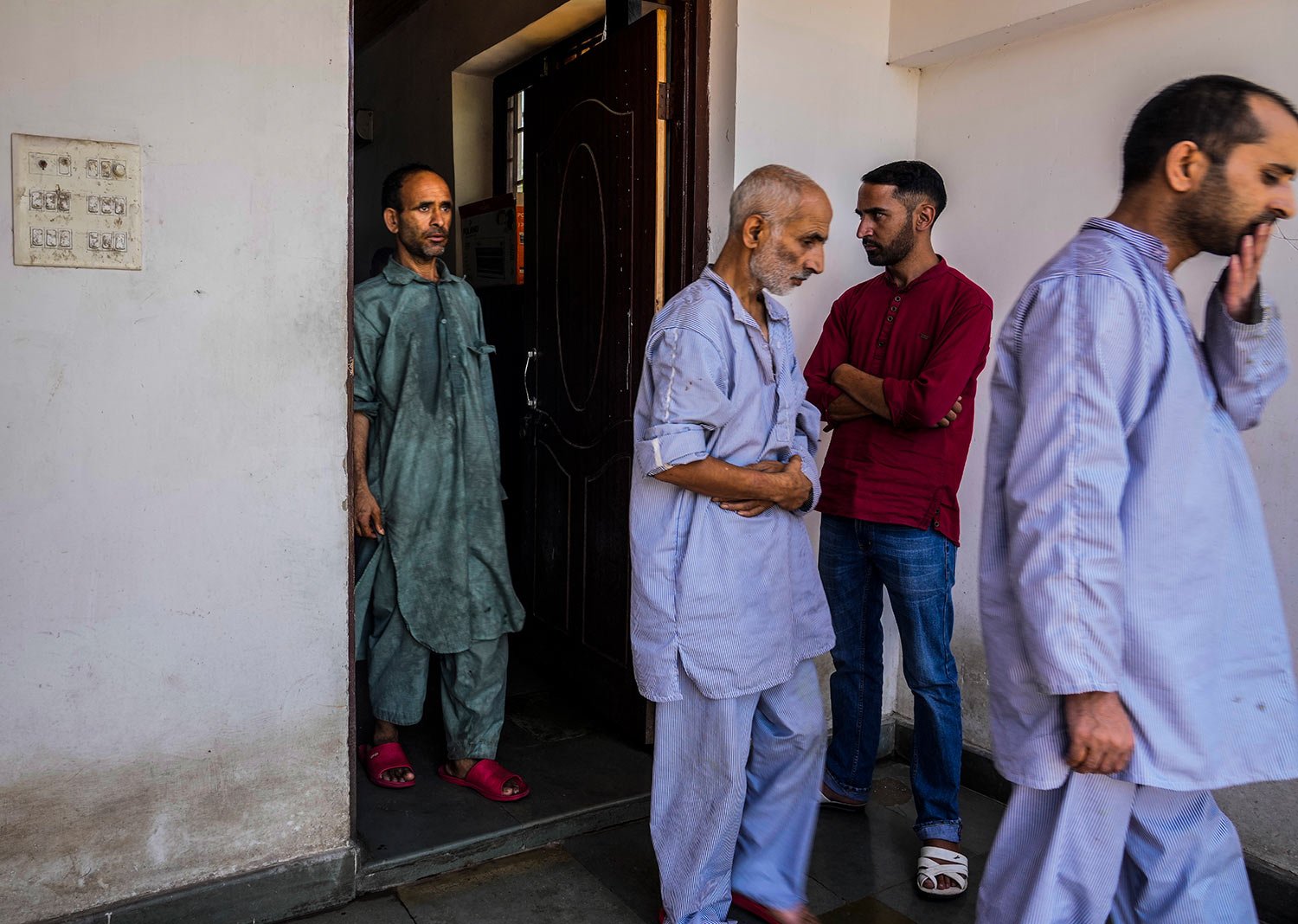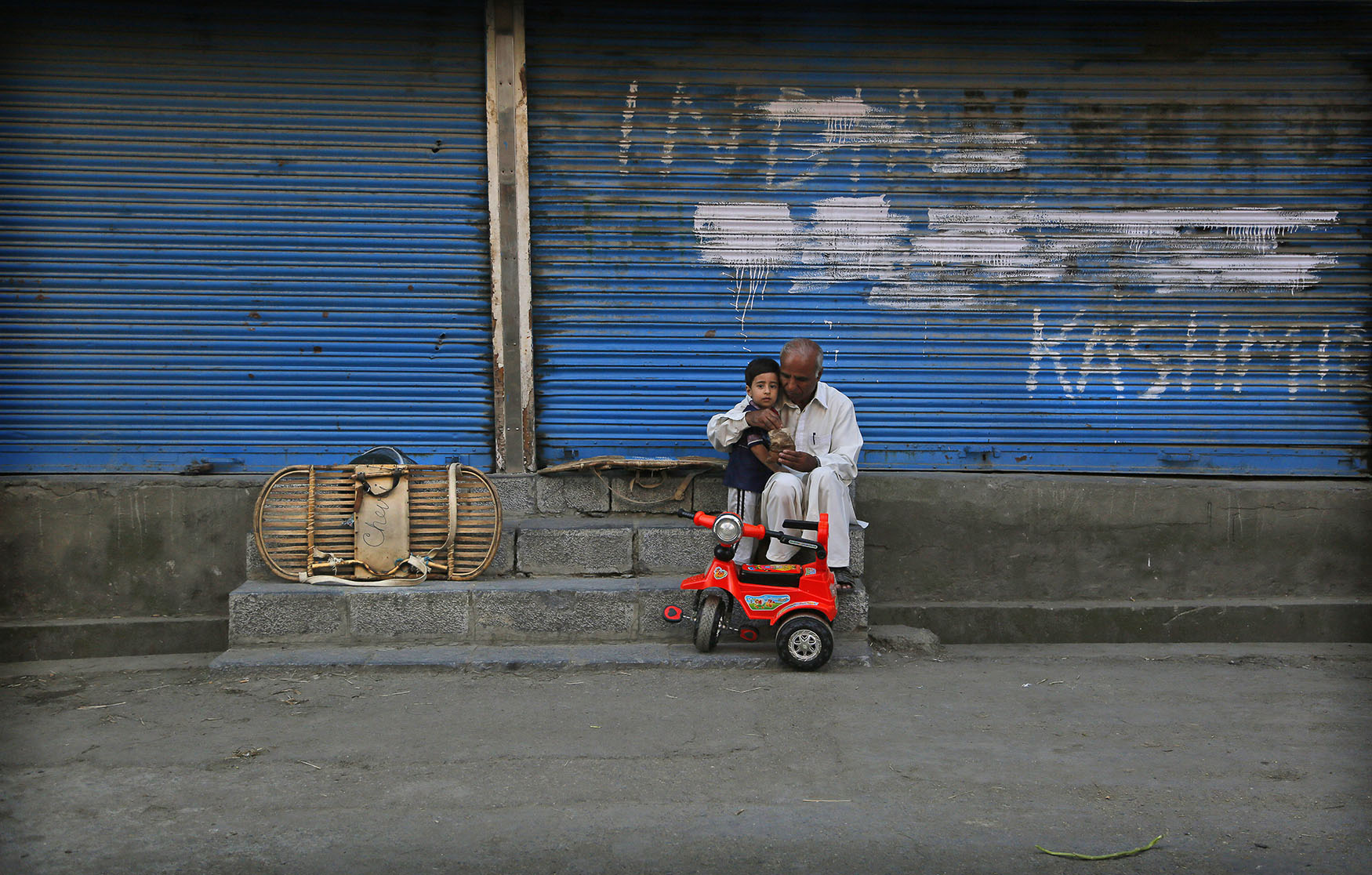AP photos of Kashmir's mental health clinics show the invisible scars of decades of conflict

After consulting with several doctors in the main city in Indian-controlled Kashmir, Aayat Hameed was advised to seek help from a mental health expert for her bouts of unspecified anxiety, random palpitation attacks and occasional but strong suicidal thoughts. A psychiatrist diagnosed her with acute depression.
On a recent hot summer day, Hameed was among scores of other patients visiting a mental health clinic in Srinagar, where she had been undergoing rounds of counselling along with prescription medication.
“I realized seeing a psychiatrist or reaching out to someone you trust really helps to deal with suicidal thoughts and depression,” Hameed said. She's already recovered about 40% over a course of her one-month treatment, the young student added.
Patients sit inside a room used as a dining area at a mental health hospital in Srinagar, Indian controlled Kashmir, Tuesday, Aug 1, 2023. (AP Photo/Mukhtar Khan)
Family members help a patient inside the outpatient department (OPD) at a mental health hospital in Srinagar, Indian controlled Kashmir, Tuesday, Aug 1, 2023. (AP Photo/Mukhtar Khan)
A Kashmiri man looks through a narrow opening at the registration counter of a mental health hospital in Srinagar, Indian controlled Kashmir, Tuesday, Aug 1, 2023. (AP Photo/Mukhtar Khan)
For over three decades, Kashmiris have been living through multiple crises. Violent armed insurrections, brutal counterinsurgency, unparalleled militarization and securitization, and unfulfilled demands for self-determination have fueled depression and drugs in the disputed region, experts say.
The stunning Himalayan region has been a flashpoint for more than 70 years for tensions and wars between rivals India and Pakistan, which both control part of it and lay claim to all of it. Despite the fierce fighting, the tight-knit Muslim families of Kashmir formed a durable safety net.
That fell apart when an armed rebellion erupted in 1989.
Since then, tens of thousands of civilians, rebels and government forces have been killed in the conflict that has left Kashmiris exhausted, traumatized and broken. Nearly every one of the Kashmir valley’s 7 million people has been touched by violence.
An elderly Kashmiri smokes a cigarette on a road as a police car patrols in Srinagar, Indian controlled Kashmir,Sunday, Aug 13, 2023.. (AP Photo/Mukhtar Khan)
Policemen rescue an elderly Kashmiri woman who tried to kill herself on the banks of the Dal lake in Srinagar, Indian controlled Kashmir, Thursday, May 18, 2023. (AP Photo/Mukhtar Khan)
The conflict has created two lost generations: the teenagers of 1989 who saw their childhoods collapse into warfare, and the teenagers of today who never had a childhood at all.
“The most basic building blocks of a healthy psyche — a sense of safety and security — are, and have been, under attack for decades in Kashmir,” said Saiba Varma, an associate professor of anthropology at the University of California, San Diego, who studied psychiatric issues in Kashmir for her doctoral research.
The daily violence has ebbed sharply in recent years, and the region’s semiautonomous status was revoked in 2019 in a move that the Indian government sold as being necessary for normalcy to return. Still, the invisible scars of Kashmir’s unending conflict are evident in the psychiatric sections of multiple hospitals where, on a routine day, hundreds seek help for mental illnesses and drug addictions.
A mentally ill man swings on a road in Srinagar, Indian controlled Kashmir, Monday, May 15, 2023. (AP Photo/Mukhtar Khan)
A 2015 study by aid group Doctors Without Borders in collaboration with the University of Kashmir and the Institute of Mental Health and Neurosciences in Srinagar showed “nearly 1.8 million adults (45% of the adult population) in the Kashmir valley are experiencing symptoms of mental distress, with 41% exhibiting signs of probable depression, 26% probable anxiety and 19% probable Post Traumatic Stress Disorder.”
The mental health care infrastructure has expanded from mere four psychiatrists and one main mental health care clinic in Srinagar in early 2000, to about 17 government-run clinics operated by over six-dozen professionals across the region today. But the mental health network is still overwhelmed.
Varma, the anthropologist, said the mental health crisis directly stems from social and political conditions in the region.
“Ongoing militarization of everyday life has eliminated many cultural and religious practices of coping that Kashmiri people traditionally relied on, leaving them dependent on an overburdened and pharmaceuticalized health care system,” she said.
People arrive as another waits outside the outpatient department (OPD) at a mental health hospital in Srinagar, Indian controlled Kashmir, Tuesday, Aug 1, 2023. (AP Photo/Mukhtar Khan)
A staff member of a mental health hospital hands medicine to a patient in Srinagar, Indian controlled Kashmir, Tuesday, Aug 1, 2023. (AP Photo/Mukhtar Khan)
A staff member of a mental health hospital serves drinking water to a patient inside a mental health hospital in Srinagar, Indian controlled Kashmir, Tuesday, Aug 1, 2023. (AP Photo/Mukhtar Khan)
A Kashmiri patient eats a meal inside a mental health hospital in Srinagar, Indian controlled Kashmir, Tuesday, Aug 1, 2023. (AP Photo/Mukhtar Khan)
Counsellors attend to calls inside a dedicated phone-in counseling center called "Tele Manas" at Kashmir's only major hospital for mental illness - IMHANS (institute of mental health and neurosciences), in Srinagar, Indian controlled Kashmir, Wednesday, Aug 2, 2023. (AP Photo/Mukhtar Khan)
People wait inside the outpatient department (OPD) at a mental health hospital in Srinagar, Indian controlled Kashmir, Tuesday, Aug 1, 2023. (AP Photo/Mukhtar Khan)
A Kashmiri woman weeps as she pray inside the shrine of Sufi saint Syed Abdul Qadir Gilani in Srinagar, Indian controlled Kashmir, Thursday, Aug 10, 2023. (AP Photo/Mukhtar Khan)
An elderly Kashmiri man waits inside the outpatient department (OPD) at a mental health hospital in Srinagar, Indian controlled Kashmir, Tuesday, Aug 1, 2023. (AP Photo/Mukhtar Khan)
Kashmiri student Aayat Hameed attends a counseling classes at a mental health hospital in Srinagar, Indian controlled Kashmir, Wednesday, Aug 9, 2023. (AP Photo/Mukhtar Khan)
Patients walk at a mental health hospital in Srinagar, Indian controlled Kashmir, Tuesday, Aug 1, 2023. (AP Photo/Mukhtar Khan)
An elderly Kashmiri woman sit inside a mental health hospital in Srinagar, Indian controlled Kashmir, Wednesday, Aug 2, 2023. (AP Photo/Mukhtar Khan)
A Kashmiri patient walks out from a mental health hospital in Srinagar, Indian controlled Kashmir, Wednesday, Aug 2, 2023. (AP Photo/Mukhtar Khan)
Kashmiri student Aayat hameed sits on the banks of the Jehlum river in Srinagar, Indian controlled Kashmir, Friday, Aug 18, 2023. (AP Photo/Mukhtar Khan)
Lead photo: Kashmiri women pray inside the shrine of Sufi saint Syed Abdul Qadir Gilani in Srinagar, Indian-controlled Kashmir, Thursday, Aug 10, 2023. (AP Photo/Mukhtar Khan)
Text from AP News story, AP photos of Kashmir's mental health clinics show the invisible scars of decades of conflict, by Mukhtar Khan
Photos by Mukhtar Khan






